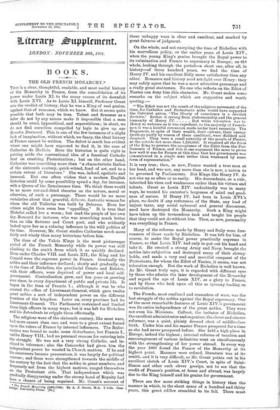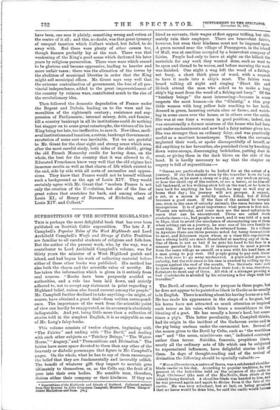BOOKS.
THE OLD FRENCH MONARCHY.*
THIS is a clear, thoughtful, readable, and most useful history of the Monarchy in France, from the consolidation of its power under Louis XI. to the many causes of its downfall with Louis XVI. As to Louis XL himself, Professor Grant sets the verdict of history, that he was a King of real genius, against that of romance, which we know. But it seems quite possible that both may be true. Talent and firmness as a ruler do not by any means make it impossible that a man should be cruel, hypocritical, and superstitious ; in short, we do not find ourselves compelled by logic to give up our Quentin .Durward. This is one of the few instances of a slight lack of imagination, without which, we fancy, the ideal history of France cannot be written. The defect is much less evident where one might have expected to find it, in the case of Catherine de Medicis. Here the historian is quite right in putting aside the conventional idea of a fanatical Catholic bent on crushing Protestantism; but on the other hand, Catherine was something more than "a characteristic Italian of the sixteenth century, quick-witted, fond of art, and to a certain extent of literature." She was, indeed, egotistic and immoral. But one often wishes that a modern English historian could by some possibility spend a day, for instance, with a Queen of the Renaissance time. We think there would be no more cut-and-dried theories on the nature, moral or otherwise, of such a personage. There would be no more certainties about that graceful, delicate, fantastic woman for whom the old Tuileries was built by Delorme. Even her crimes might then seem less " appalling," It is true that Michelet called her a worm ; but read the people of her own day, Ronsard for instance, who was something much better than an idle flatterer and Court poet; and who evidently looked upon her as a calming influence in the wild politics of the time. However, Mr. Grant studies Catherine much more fairly and wisely than many historians before him.
The time of the Valois Kings is the most picturesque period of the French Monarchy while its power was still climbing to the zenith from which it so quickly declined.
Even under Charles VIII. and Louis XII., the King and his Council were the supreme power in France. Gradually the
nobles and their influence declined; slowly and gradually, up to the time of Richelieu, the provincial Courts and Estates, with their officers, were deprived of power and local self- government. Centralisation grew, and has gone on growing ever since, in every department of public and private life. It began in the time of Francis I. ; although it was he who created the office of Lieutenant-General, which gave twelve great nobles a sort of independent power on the different frontiers of the kingdom. Later on, every province had its Lieutenant-General. The Parliament restrained and limited these high officers in many ways; but it was left for Richelieu and his Intendants to cripple them effectually.
The religions wars of the sixteenth century, like most wars, bad more causes than one, and were to a great extent forced upon the rulers of France by internal influences. The Refor- mation was bound to make some disturbance, but Francis I., unlike Hemy VIII., had no personal reasons for entering into the struggle. He was not a very strong Catholic, and in- clined to tolerance : also the Concordat had given him the independent power he wanted in Church matters. If he and his successors became persecutors, it was largely for political reasons ; and these were strengthened towards the middle of the century by the fact that the nobles in great numbers, and frequently not from the highest motives, ranged themselves on the Protestant side. That independence which was gradually disappearing under the strong hand of Royalty had here a chance of being regained. Mr. Grant's account of *VIE, French Monarchy (1483-1789). By A. J. Grant, M.A. 2 vols. CAM- orldge : University Press. [95.] these unhappy wars is clear and excellent, and marked by great fairness of judgment.
On the whole, and not excepting the time of Richelieu with his marvellous policy, or the earlier years of Louis XIV., when the young King's genius brought the Royal power to
its culmination and France to supremacy in Europe; on the whole, looking through the period—a short one, after all, in history—of three hundred years, we find the time of Henry IV. and his excellent Sully more satisfactory than any other. Romance and history need not fight over Henry : they may safely agree that he was a most attractive personage and a really great statesman. No one who reflects on the Edict of Nantes can deny him this character. Mr. Grant makes some remarks on the subject which are suggestive and worth quoting
The Edict was not the result of the religious movement of the time, for Catholics and Protestants alike would have supported the Calvinist axiom, • The liberty of conscience is a devilish doctrine.' Rather it sprang from statesmanship and the general
humanity of Henry IV But while toleration was to Henry as welcome as it was expedient, to the majority of French. men it was a hateful concession made under hard necessity. The Huguenots, in spite of their wealth, their culture, their energy (perhaps partly by reason of these qualities), were disliked and despised. They were a small minority of the people of France, at the outside not more than 1,250,000. It required all the force of the King to procure the acceptance of the Edict from the Par- liaments of France, and this is one argument the more to prove how well it was for France at this time that her government was concentrated in a single man rather than weakened by some form of representation."
It is very true; then, as now, France wanted a true man at
her head, and was not, any more than she is now, a nation to be governed by Parliaments. But Kings like Henry IV. do not rise up so often or so easily. His descendants, as a rule, inherited his vices and weaknesses rather than his virtues and talents. Great as Louis XIV. undoubtedly was in many ways, he wanted his ancestor's largeness of mind and good- ness of nature. If Henry IV. had been in Louis XVI.'s place, we doubt if any rottenness of the State, any load of unjust taxes, any social upheaval and general discontent, need have destroyed the Monarchy. Such a King might have taken up the tremendous task and taught his people that they could not do without him. Then, as now, personality was everything in France.
Many of the reforms made by Henry and Sully were fore- runners of those made by Richelieu. It was left for him, of
course, to make the Royal power practically supreme in France, so that Louis XIV. had only to put out his hand and take it. He created a strong Army and Navy, brought the nobles into subjection and destroyed many of their strong- holds, and made a very real and merciful conquest of the Protestants, for whom the Edict of Nantes, it seems, was not toleration enough. But the work of Richelieu is well known. As Mr. Grant truly says, it is regarded with different eyes
by those who admire the later development of the Monarchy and regard the age of Louis XIV. as a glory to France, and by those who look upon all this as tyranny leading on to revolution.
The Fronde, most confused and reasonless of wars, was the last struggle of the nobles against the Royal supremacy. One of the most remarkable features of Louis XIV.'s government was its entire independence of the great nobles. They were not even his Ministers. Colbert, the imitator of Richelieu, the excellent administrator and organiser, the clever and sincere reformer, was a quiet, plainly dressed clerk of middle-class birth. Under him and his master France prospered for a time as she had never prospered before. She held a high place in Europe, indeed the highest; internal reforms of taxation and encouragement of various industries went on simultaneously with the strengthening of her power abroad. In every way the year 1660 found the France of the Monarchy at its
highest point. Manners were refined, literature was at its zenith, and it is very difficult, as Mr. Grant points out in his excellent sketch of Louis XIV.'s Court, in spite of Saint- Simon and other such clever gossips, not to see that the credit of France's position, at home and abroad, was largely due to the King himself and his genius for government.
There are few more striking things in history than the manner in which, in the short space of a hundred and thirty years, this great edifice crumbled to its fall. There must
have been, one sees it plainly, something wrong and rotten at the centre of it all ; and this, no doubt, was that great tyranny of unequal taxation which Colbert wished, but failed, to do away with. But there were plenty of other causes too, though finance probably lay at the root. There was that weakening of the King's good sense which darkened his later years by religious persecution. There were wars which ceased to be glorious and became oppressive, leading to heavier and more unfair taxes ; there was the alienation of the towns by the abolition of municipal liberties in order that the King might sell municipal offices. Mr. Grant says very well that the extreme centralisation of government, the loss of all pro- vincial independence, added to the great impoverishment of the country by ruinous wars, contributed much to the rise of the revolutionary idea.
Then followed the domestic degradation of France under the Regent and Dubois, leading on to the wars and im- moralities of the eighteenth century ; resistance and sup- pression of Parliaments ; internal misery, debt, and famine ; till a country bankrupt in all its institutions could do nothing but stagger on to some great catastrophe, the virtues of its last King being too late, too ineffective, to save it. New ideas, medi- reval institutions and taxation, a rotten, bankrupt Government : revolution of some sort was inevitable. Yet we are grateful to Mr. Grant for the clear sight and strong sense which sees, after the most careful study, both sides of the shield; giving the old French Monarchy credit for having done, on the whole, the best for the country that it was allowed to do, Educated Frenchmen know very well that the old regime had immense merits as well as that charm of life which existed to the end, side by side with all sorts of anomalies and oppres- sions. They know that France would not be herself without such a background as the age of Louis XIV. They would certainly agree with Mr. Grant that " modern France is not only the creation of the Revolution, but also of the line of great rulers that stretches far back, and among others of Louis XI., of Henry of Navarre, of Richelieu, and of Louis XIV. and Colbert."



























































 Previous page
Previous page